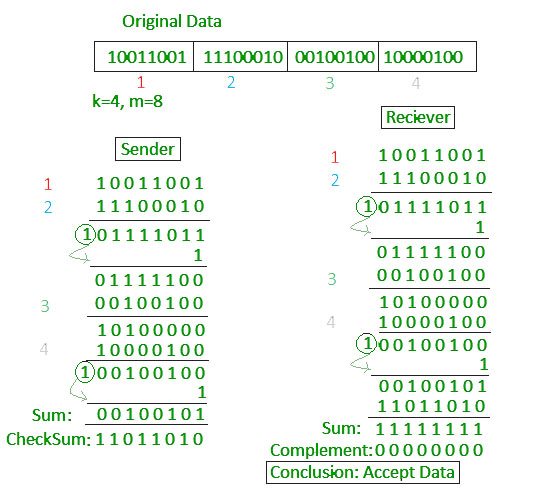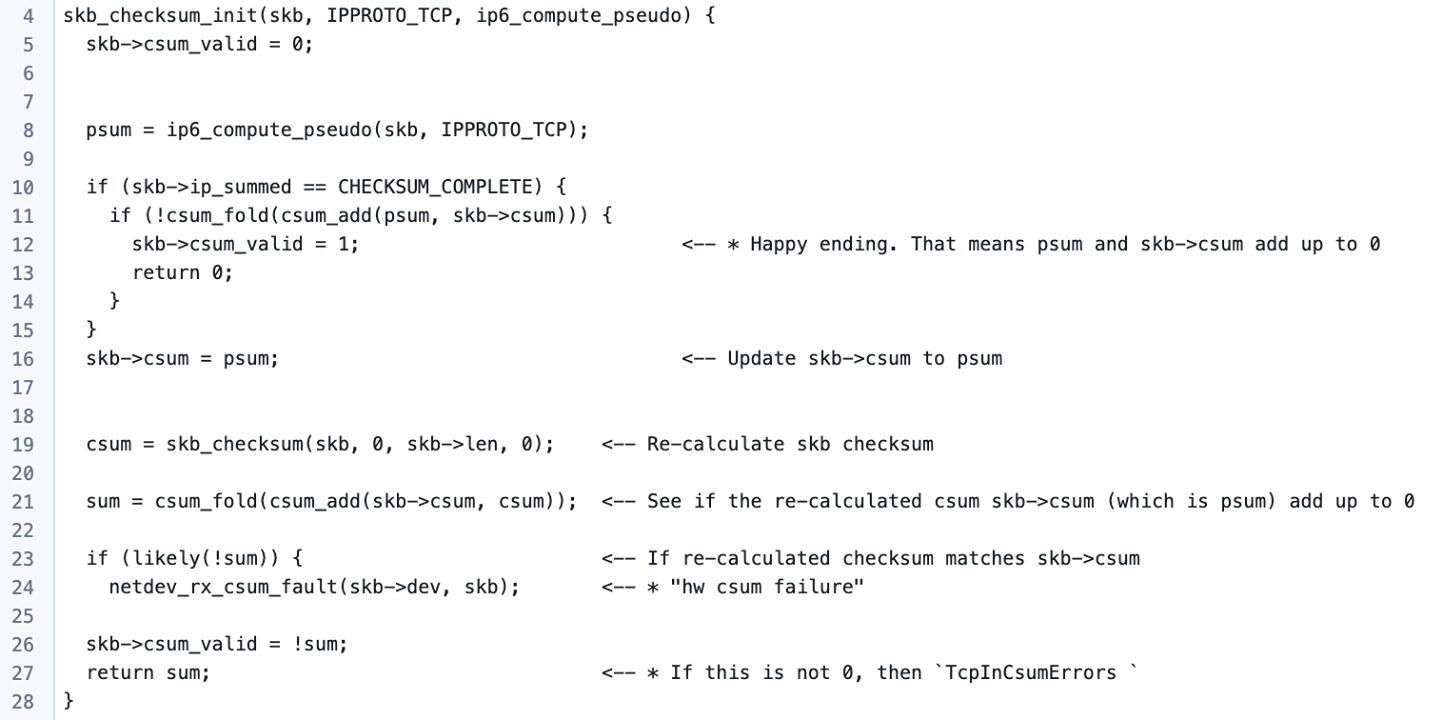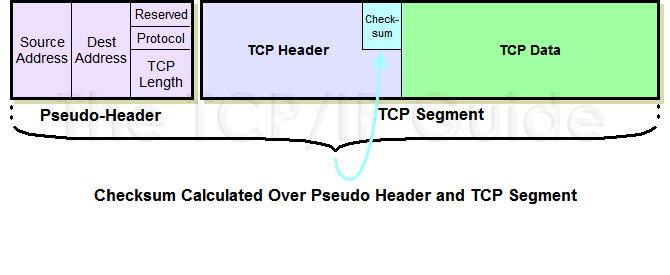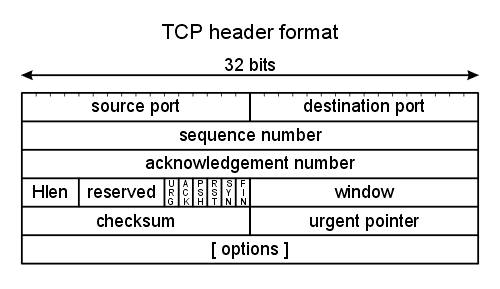tl;dr
If you don’t want to shoot yourself in the foot, then don’t mess up with checksum in any way. But if you’d like to see a counterexample, keep reading this note written by lame me.
Background
I have a ingress TC BPF program that modify a few bits in IP header and a TCP flag of certain incoming packets. It worked really well functionally. Until…
dmesg filed a complaint
While testing the program, the following message was found in dmesg:
[1216218.835883] <unknown>: hw csum failure
[1216218.843767] CPU: 11 PID: 3627719 Comm: ThriftIO15 Not tainted 4.16.18-210_fbk23_5358_gf2838c074351 #210
[1216218.862917] Hardware name: Quanta Twin Lakes MP/Twin Lakes Passive MP, BIOS F09_3A12 10/08/2018
[1216218.880669] Call Trace:
[1216218.885910] <IRQ>
[1216218.890287] dump_stack+0x46/0x68
[1216218.897272] __skb_checksum_complete+0xb0/0xc0
[1216218.906516] tcp_v6_do_rcv+0x12b/0x3d0
[1216218.914370] tcp_v6_rcv+0xad0/0xb00
[1216218.921701] ip6_input_finish+0xbf/0x460
[1216218.929903] ip6_input+0x80/0x90
[1216218.936714] ipv6_rcv+0x358/0x4c0
[1216218.943698] ? tcf_classify+0x87/0x120
[1216218.951551] __netif_receive_skb_core+0x541/0xa40
[1216218.961315] netif_receive_skb_internal+0x24/0xb0
[1216218.971080] napi_gro_receive+0xba/0xe0
[1216218.979105] mlx5e_handle_rx_cqe+0x83/0xd0
[1216218.987649] mlx5e_poll_rx_cq+0xc8/0x920
[1216218.995840] mlx5e_napi_poll+0xa1/0xc30
[1216219.003866] net_rx_action+0x128/0x340
[1216219.011718] __do_softirq+0xd4/0x2ad
[1216219.019219] irq_exit+0xa5/0xb0
[1216219.025850] do_IRQ+0x7d/0xc0
[1216219.032132] common_interrupt+0xf/0xf
[1216219.039798] </IRQ>
That was how I got pushed into the checksum abyss.
Root cause and solution
The message indicated a checksum error. I asked tcpdump to double check but he said checksums are fine. Then I realized that the ingress TC BPF program runs after tcpdump and before kernel receiving the packets. That can explain why tcpdump didn’t have a problem with checksum but kernel complained.
The root cause is clear: the ingress BPF program meddled with bits in TCP/IP headers but didn’t fix the checksum. The solution also seems to be simple: JUST FIX THE CHECKSUM.
Well, I will save some time for both of us by not complaining about the pain in
finding the needle in a haystack full of checksum-related API such as
bpf_l3_csum_replace, bpf_l4_csum_replace, bpf_csum_diff and
bpf_csum_update`.
What more frustrating was, in the end, a simple BPF_F_RECOMPUTE_CSUM flag
passed to bpf_skb_store_bytes (which is used to modify bits) did the trick.
How does checksum work?
Before digging into more details, let’s have a look at how checksum works. The following diagram is a very good illustration.

(Image credit: https://www.geeksforgeeks.org/error-detection-in-computer-networks/)
In this post, to avoid confusion, I will use the term “csum” to refer to
the “sum” in the diagram above and use the term “checksum” to refer to
1’s complement of “csum”. As you can see, as long as the data is not tampered,
~(csum + checksum) == 0.
One more puzzle to solve
While debugging, I found one thing interesting - though the error was printed, the packet wasn’t discarded so that the processing continued. Why?
Since some inline functions are not shown in the stack trace above, I will just “flatten” the logic of the call stack here:
tcp_v6_do_rcv() {
// Checking checksum is unnecessary
if (skb_csum_unnecessary(skb)) {
nothing;
} else {
// Re-do checksum for whole skb
csum = skb_checksum(skb, 0, skb->len, 0);
// Check csum against skb->csum. If skb is intact, sum should be 0
sum = csum_fold(csum_add(skb->csum, csum));
if (sum == 0)
Print "hw csum failure" to dmesg and dump stack trace
else
Checksum fails, throw the skb away
}
// Continue processing skb
}
When the error is printed, the following conditions must meet:
skb_csum_unnecessaryreturnsfalse.- If we calculate a checksum of the
skband check it againstskb->csum, it should pass. That is,csum_add(skb->csum, skb_checksum(skb))should return zero.
When skb_csum_unnecessary returns false, it means skb->csum_valid is
false,
which in turn means skb->csum_valid is not set to 1 during
skb_checksum_init.
And that’s because the original skb->csum and psum don’t add up to
zero.
Also note that skb->csum is set to psum after
skb_checksum_init.
In human language, this piece of code means,
“If I am running, that means checking the skb->csum provided by hardware
(NIC) against psum (I will talk about it later) must have failed. Screw you,
hardware! (error printed) But you know what, I recalculated the skb’s checksum
and it’s indeed correct. Let’s forget about hardware error and continue!”
The hardware was undoubtedly innocent, it was my BPF program who commit the crime. So even if the packets were not discarded and connectivity was not affected, I still fixed the guilty BPF program to prove hardware’s innocence.
While I was celebrating yet another closed case, I had no idea what the criminal was up to.

Checksum is fxxked up, again?
While deploying the BPF program, I found that InCsumErrors kept increasing
once the program is attached.
$ netstat -s | grep InCsumErrors
InCsumErrors: 101
Debugging
I can’t talk about kernel debugging without mentioning my best buddy - bpftrace. This time again, with its help, I was able to narrow the issue down to the following stack:
__skb_checksum_complete+1
tcp_v6_do_rcv+293
tcp_v6_rcv+2762
ip6_input_finish+186
ip6_input+128
ipv6_rcv+853
__netif_receive_skb_core+1312
netif_receive_skb_internal+36
napi_gro_receive+183
mlx5e_handle_rx_cqe+125
mlx5e_poll_rx_cq+194
mlx5e_napi_poll+161
net_rx_action+290
__softirqentry_text_start+207
irq_exit+165
do_IRQ+119
ret_from_intr+0
cpuidle_enter_state+176
do_idle+260
cpu_startup_entry+25
secondary_startup_64+165
The stack is same as previous issue. However, this time, there is no error message in dmesg and the packet IS discarded, causing a retransmission. In tcpdump, what I saw was the following sequence:
- A TCP SYN packet arrives but it doesn’t get a SYN-ACK.
- After one second, a retransmitted SYN packet arrives and got a SYN-ACK.
- The connection is successfully established.
Guessing & Praying
After hours of browsing kernel code without any major findings, I decided to use the not-so-scientific yet effective way of debugging - try out different things hoping to find a working solution and pray to god to increase the success rate.

Then I noticed that the issue only happened when the TCP header is modified.
Even though skb->csum is fixed accordingly using BPF_F_RECOMPUTE_CSUM after
the modification. I decided to see what would happen if the skb->csum is not
fixed after TCP header is modified. And, to my surprise, it works!
The following table shows things I tried and their results:

At least two questions came out of this table:
- Why “hw csum failure” if NOT recomputing csum for IP header change?
- Why “TcpInCsumErrors” if recomputing csum for TCP header change?
The next goal is to answer these two questions and make sure I discovered a solution instead of a coincidence.
Chasing the answers
TcpInCsumErrors error happens because skb_checksum_init returns non-zero
value.
The call stack is a bit involved. So let’s flatten the logic again (Irrelevant
code has been omitted).

I marked the two error cases in above code. We need to be very careful with the logic so that we can avoid both errors while messing up with checksums.
What is ip6_compute_pseudo?
It calculates the csum of TCP pseudo header. The result is the psum we’ve seen above.

What triggers “hw csum failure”?
The following conditions must all be met:
~(psum + skb->csum) != 0That is, checking of theskb->csumagainstpsumfails.~(skb_checksum(skb, 0, skb->len, 0) + psum) == 0That is, checking of the newly calculated csum ofskbagainstpsumpasses.
What triggers “TcpInCsumErrors”?
The following conditions must all be met:
~(psum + skb->csum) != 0That is, checking of theskb’s csum againstpsumfails.~((skb_checksum(skb, 0, skb->len, 0) + psum) != 0That is, checking of the newly calculated csum ofskbagainstpsumalso fails.
Something is strange
You may have noticed something strange. The skb->csum is checked against
psum, the checksum of the pseudo header. Why is that? Shouldn’t it be checked
against the checksum of the whole skb using something like ~(skb->csum +
checksum(skb)) == 0?
I will try my best to explain it. The key is, like the diagram above shows, TCP header also has a checksum.

And the formula of calculating TCP header checksum is
tcp_hdr_checksum = ~(pseudo_hdr + tcp_hdr_with_checksum_0)
Note:
- I will use “+” to denote “csum add”, the algorithm shown in the diagram in “How does checksum work?” section.
- Payload is intentionally omitted because it doesn’t matter.
skb->csum is a 16-bit csum calculated by
NIC
using the whole packet. That is,
skb->csum = ip_hdr + tcp_hdr
Note:
- When doing “csum add”, both IP and TCP headers are “sliced” into 16-bit chunks which are added up / folded together.
- Because IP header, pseudo header and TCP header are all 16-bit aligned, the two formulas can be rewritten to
tcp_hdr_checksum = ~(pseudo_hdr_0_15 + pseudo_hdr_16_31 + ... +
tcp_hdr_0_15 + tcp_hdr_16_31 + ... + 0x0000 (checksum) + ...)
If we do “~” operation on both sides, we get
~tcp_hdr_checksum = pseudo_hdr_0_15 + pseudo_hdr_16_31 + ... +
tcp_hdr_0_15 + tcp_hdr_16_31 + ... + 0x0000 (checksum) + ...
Then we add tcp_hdr_checksum on both sides:
~tcp_hdr_checksum + tcp_hdr_checksum
= pseudo_hdr_0_15 + pseudo_hdr_16_31 + ... +
tcp_hdr_0_15 + tcp_hdr_16_31 + ... + tcp_hdr_checksum + ...
Because we know that ~tcp_hdr_checksum + tcp_hdr_checksum = 0xFFFF. So
pseudo_hdr_0_15 + pseudo_hdr_16_31 + ... +
tcp_hdr_0_15 + tcp_hdr_16_31 + ... + tcp_hdr_checksum + ... = 0xFFFF
Thus,
tcp_hdr_0_15 + tcp_hdr_16_31 + ... + tcp_hdr_checksum + ...
= 0xFFFF - (pseudo_hdr_0_15 + pseudo_hdr_16_31 + ... )
= 0xFFFF - psum
We can plug this into skb->csum
skb->csum = ip_hdr_0_15 + ip_hdr_16_31 + ... +
tcp_hdr_0_15 + tcp_hdr_16_31 + ... + tcp_hdr_checksum + ...
= ip_hdr_0_15 + ip_hdr_16_31 + ... + 0xFFFF - psum
Keep this formula in mind and I will answer the two questions above.
Why “hw csum failure” if NOT recomputing csum for IP header change?
(For simplicity, let’s assume TCP header is not changed.)
In the kernel network stack, after IP header is processed, its csum is pulled
out of or subtracted from
skb->csum.
Then skb->csum becomes
skb->csum = (ip_hdr_0_15 + ip_hdr_16_31 + ... + 0xFFFF - psum) -
(ip_hdr_0_15 + ip_hdr_16_31 + ...)
= 0xFFFF - psum
Now we know why in skb_checksum_init, skb->csum is checked against psum –
because it’s the only variable left in the formula.
However, if the IP header is changed (say, a few bits in ip_hdr_16_31 are
flipped) but skb->csum is not changed accordingly, then it becomes
skb->csum = skb->csum - (ip_hdr_0_15 + ip_hdr_16_31' + ...)
= (ip_hdr_16_31 - ip_hdr_16_31') + 0xFFFF - psum
-
The first condition for “hw csum failure” is
~(psum + skb->csum) != 0or(psum + skb->csum) != 0xFFFF. And the math ispsum + skb->csum = psum + (ip_hdr_16_31 - ip_hdr_16_31') + 0xFFFF - psum = (ip_hdr_16_31 - ip_hdr_16_31') + 0xFFFFThe result is apparently not
0xFFFF. So the first condition is met. -
The second condition for “hw csum failure” is
~(skb_checksum(skb, 0, skb->len, 0) + psum) == 0orskb_checksum(skb, 0, skb->len, 0) + psum == 0xFFFF.skb_checksum(skb, 0, skb->len, 0)is to re-calculate csum of skb, which now only has TCP header. It will beskb_checksum(skb, 0, skb->len, 0) = tcp_hdr_0_15 + tcp_hdr_16_31 + ... + tcp_hdr_checksum + ... = 0xFFFF - psumTherefore,
skb_checksum(skb, 0, skb->len, 0) + psum = 0xFFFF - psum + psum = 0xFFFFThe second condition is also met. The question is answered.
Why “TcpInCsumErrors” if recomputing csum for TCP header change?
(For simplicity, let’s assume IP header is not changed.)
Note that when we use BPF_F_RECOMPUTE_CSUM, it only updates skb->csum but
NOT tcp_hdr_checksum. Suppose a few bits in tcp_hdr_0_15 are flipped. When
skb_checksum_init is called, skb->csum is in fact skb->csum'.
skb->csum’ = tcp_hdr_0_15' + tcp_hdr_16_31 + ... + tcp_hdr_checksum + ...
= tcp_hdr_0_15' - tcp_hdr_0_15 +
tcp_hdr_0_15 + tcp_hdr_16_31 + ... + tcp_hdr_checksum + ...
= tcp_hdr_0_15' - tcp_hdr_0_15 + 0xFFFF - psum
-
The first condition for “TcpInCsumErrors” is
~(psum + skb->csum') != 0or(psum + skb->csum') != 0xFFFF. So the math ispsum + skb->csum' = psum + tcp_hdr_0_15' - tcp_hdr_0_15 + 0xFFFF - psum = tcp_hdr_0_15' - tcp_hdr_0_15 + 0xFFFFThe result is apparently not
0xFFFF. So the first condition is met. -
The second condition for “TcpInCsumErrors” is
~(skb_checksum(skb, 0, skb->len, 0) + psum) != 0orskb_checksum(skb, 0, skb->len, 0) + psum != 0xFFFF.skb_checksum(skb, 0, skb->len, 0)is to re-calculate csum of skb. It will be same asskb->csum'so the math is the same as the first condition. In other words, the second condition is also met.
As you can see, if we don’t fix skb->csum when updating tcp_hdr_0_15, the
first condition won’t be met and the code will return from the happy ending
path directly.
Wait, isn’t this a hack?
Yes, I agree. Updating the TCP header but not updating its checksum and
skb->csum sounds like a hack. The alternative is:
- Update bits in TCP header.
- Update
skb->csumto reflect the bits change. - Update TCP checksum field to reflect the bits change.
- Update
skb->csumto reflect the TCP checksum change.
In this way, the diff in the TCP header and the diff in TCP checksum cancel out each other. The math will be
skb->csum’ = tcp_hdr_0_15' + tcp_hdr_16_31 + ... + tcp_hdr_checksum' + ...
= tcp_hdr_0_15' - tcp_hdr_0_15 +
tcp_hdr_0_15 + tcp_hdr_16_31 + ... +
tcp_hdr_checksum - tcp_hdr_checksum + tcp_hdr_checksum' + ...
= (tcp_hdr_0_15' - tcp_hdr_0_15) +
(tcp_hdr_checksum' - tcp_hdr_checksum) +
0xFFFF - psum
= 0xFFFF - psum
Since the result is same as not touching skb->csum at all, why not just using
the hack?
Takeaways
- Do NOT mess up with checksum if you could.
- The person who invented checksum is a genius.
- I am a fool.
